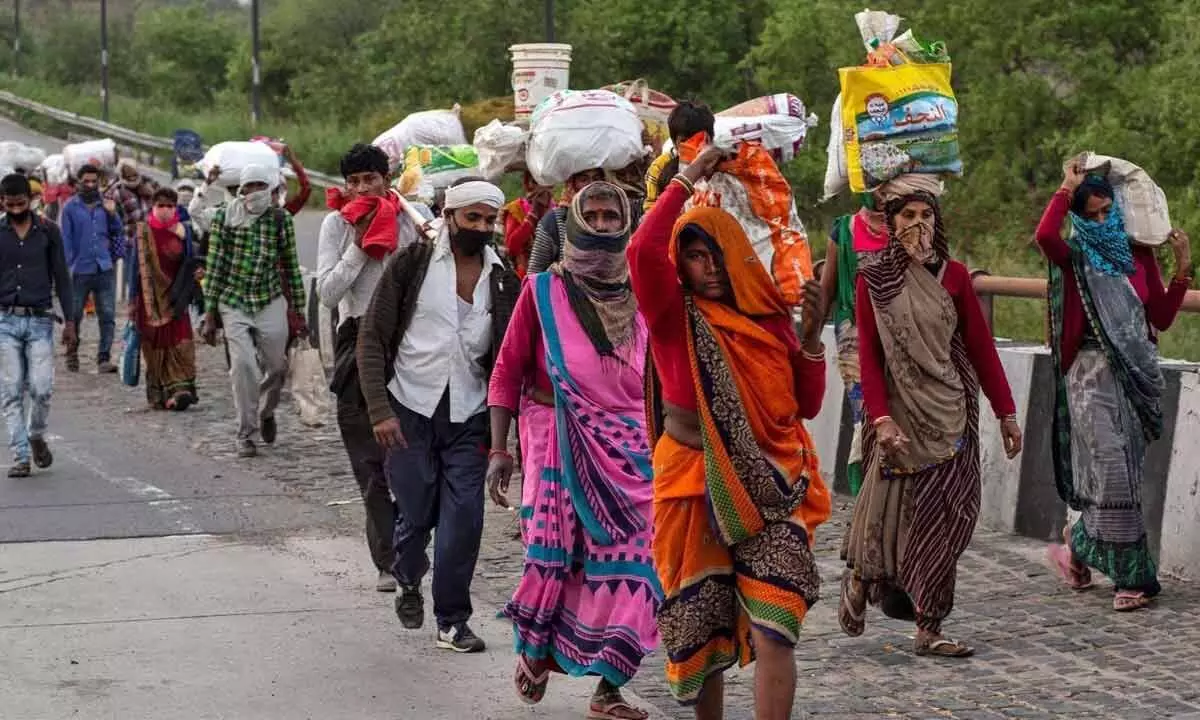Remote voting may empower migrants

Remote voting may empower migrants
The exercise will bring an estimated 30 crore voters not currently able to exercise their vote into the voting arena. Understanding can be reached between the home and host State about the model code of conduct to eliminate the influence of candidates
After one round of elections during 2020-21, which mandated the use of postal ballots by the people affected by Covid in several states, the Election Commission of India is now mulling over ways to introduce a remote voting system for domestic migrant workers and overseas citizens. In December last year, EC announced that, to strengthen democracy and make it more inclusive, remote voting for domestic migrant voters would be taken up on a pilot basis through the remote EVMs.
Against this backdrop, an all-recognised parties meeting was held on January 18, 2023. Though the otion was around since the 2000s, it never got much attention. Even now, in the all-party meeting, Congress and other state parties opposed the idea on grounds of lack of migrants' population data and the security of RVMs.
Moreover, the Election Commission is also set to allow aged and disabled people the vote-from-home option in the upcoming Karnataka elections. At a time when remote voting is under consideration, it is essential to analyse how promising this can be. The exercise will bring an estimated 30 crore voters not currently able to exercise their vote into the voting arena.
Multi-Constituency Remote Electronic Voting Machine can handle multiple constituencies upto 72 from a single remote polling booth. It will be a standalone device that doesn't need connectivity to operate. It comes equipped with the same features as those of present EVMs with an electronic ballot display instead of a fixed paper display. The voters need to register by applying online or offline within a notified time-frame. Their information will be then verified in their home constituencies by the returning officers.
Karnataka and Mizoram would be the two states that could benefit if this system is unravelled immediately. With this system being the first of its kind, the question remains as to how it should be implemented.
Important areas to be worked on
The infrastructure and logistical facilities should be provided full-fledged, a plenty of time should be given to the voters to register, machines should be checked for rigging, the migrant workers' information must be verified and re-verified and the counting of votes should be properly done without any malpractices. Understanding can be reached between the home and host State about the model code of conduct to eliminate the influence of candidates.
Criteria can be evolved to determine the eligibility of migrants. The cause of migration should be given importance when considering the years of residence outside the home state. On the other hand, remote voting options like postal ballot, online voting, and the remote voting machine should be experimented with as per the feasibility in each state. A reminder to register for the votes can also be sent to these voters.
Hacking and tampering should be under check. Use of enhanced technology and the recorded and verified migrant data will address the concerns raised by the opposition. This system should be in place for local, state and national elections as it will create a sense of belonging for domestic migrants.
How beneficial is it?
Given the number of migrant workers, it will create an impact on election outcomes. According to the 2011 census, there are an estimated 453.6 million (45.36 crore) internal migrants in India. The domestic migrants are mainly concentrated in Tamil Nadu, Kerala, Andhra Pradesh, Telangana, Gujarat, Maharashtra and Uttar Pradesh.
The migrant labourer can tell about his problems and get help from his home state too and invariably this will make the elected representatives responsive. It will give voting rights to these people who were not getting them and that will strengthen democracy. In the long run, if implemented properly, this will pave the way for voting by NRIs via e-voting methods. It may also give the sons-of-the-soil the identity of their state. These votes can give third-party choices as votes are cast by outsiders and transparency can be maintained. Additionally, these voters can determine the outcome.
Whereas, on the flip side, some of the challenges could be increased with chances of bogus voting and misuse of voting rights as parties may try to induct their people on the pretext of migrants for getting votes. There can also be tampering with votes which need to be thoroughly dealt with in the planning stage. This will lead to extra expenditure on the government for infrastructure and deploying polling agents and returning officers. For the counting of votes, an understanding can be reached between the source and destination states.
As it is evident, the move can open the doors for election reforms and a step towards democratisation of the underprivileged. As the parliament elections are due next year, the government can take up this initiative this year and experiment with the state elections.











